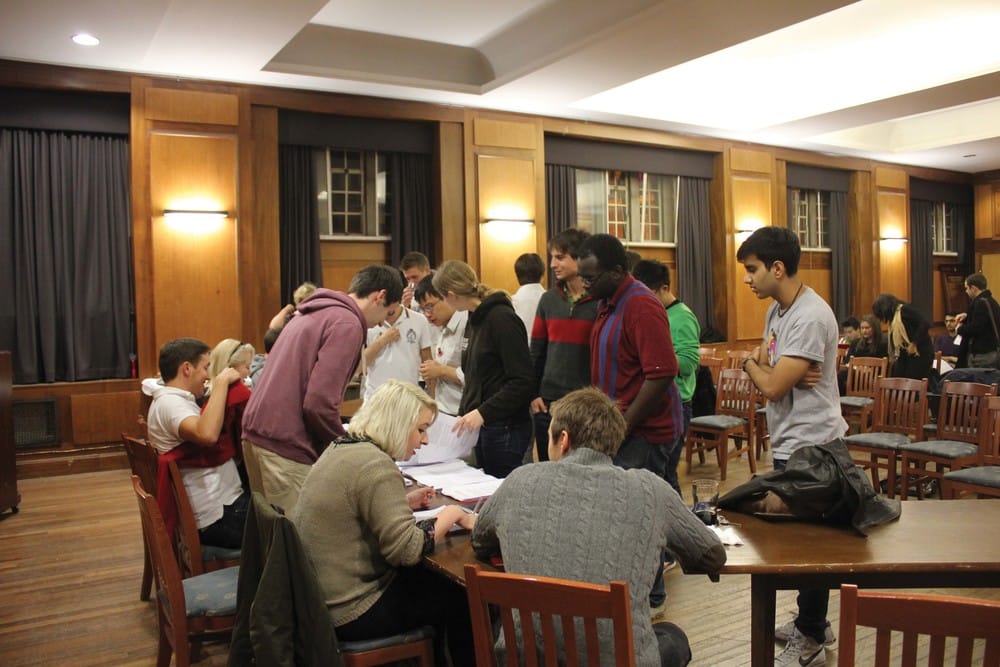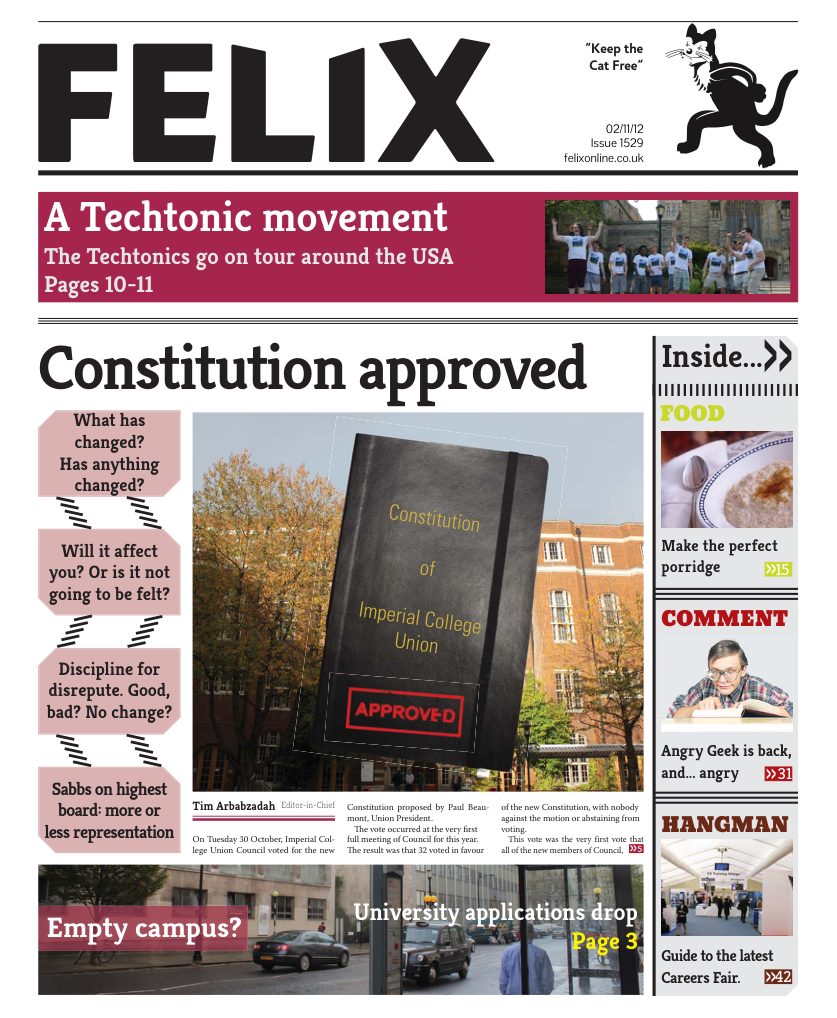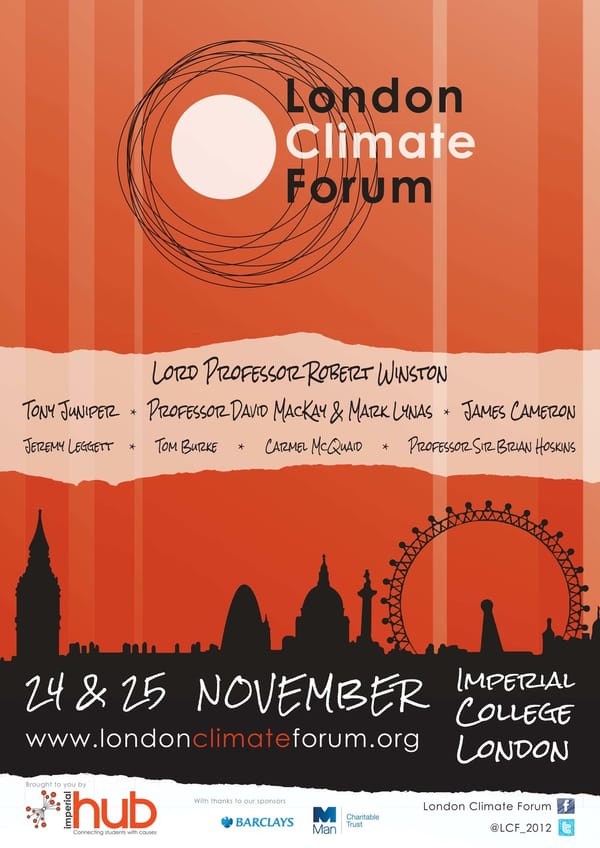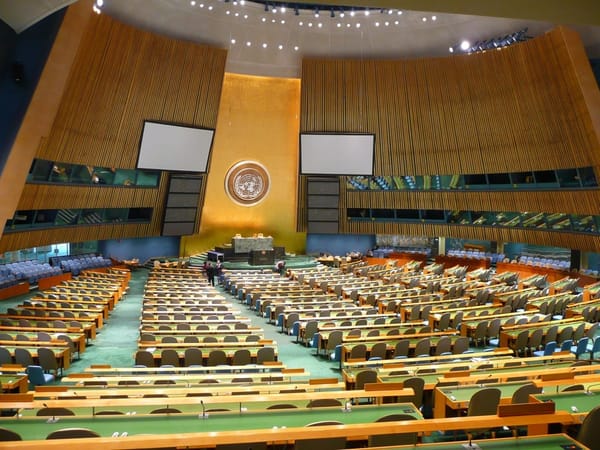Constitution approved
The Constitution changes have been approved by Council

On Tuesday 30 October, Imperial College Union Council voted for the new Constitution proposed by Paul Beaumont, Union President.
The vote occurred at the very first full meeting of Council for this year. The result was that 32 voted in favour of the new Constitution, with nobody against the motion or abstaining from voting. This vote was the very first vote that all of the new members of Council, who were only recently elected, had to make. It had previously been questioned, by the Court, as to whether it was too soon for such an important vote to occur, and if they realistically had had enough time to actually look over the proposals in full. It was argued that the time frame was too short, and that there was no way that people would have sufficient time to study the new and old Constitutions in full (especially considering the ever present, ominous Imperial work load). The retort by Beaumont was that the papers were all widely available online and were circulated to all candidates, as well as the emails encouraging everyone to read them. Beaumont said that everyone had had ample time. The concern that the additions made over the weekend were not properly seen were also raised.
Council Chair, Michael Foster, stated that the Council’s discussion would be run by the following procedure: a member of the floor posing a question and then receiving an answer from Beaumont. The reasoning given was that it was assumed that everyone had read everything beforehand and therefore seen both sides of the arguments. However, Felix has found out that there are members of Council who did not read everything beforehand. This decision was questioned by the Court, with the objection swiftly brushed aside.
There were a few contentious points in the new Constitution. The fact that the Union now is able to discipline members for bringing the Union into disrepute was one. This was brought up at Council, and the response was that it was already in the College Ordinances. The addition was said to be nothing new due to this, with no new powers given to anyone.
It was not actually defined what action could be considered to be bringing the Union into disrepute. An individual accusing the Union of acting in an untoward manner could not be punished if the matter was found to be true: those participating in said action would be disciplined.
Diving deeper into the matter to see how this could affect anyone, it is a copy and pasting from the College’s Disciplinary Ordinances. In the College’s Ordinances, which stood before the current, new Constitution, anyone bringing the name of the College into disrepute can be disciplined by the College. As stated in Ordinance D8 point 29. It states in another part of the Disciplinary Section that any matters to do with the Union are dealt with by the Union President. The Union therefore will discipline an individual instead of College. This has happened as recently as the PhysSoc incident. This can be seen as a positive for students, as the discipline will not be on a permanent College record. The negative is that the disrepute rule does now have the potential to discourage those wanting to criticise from doing so. Although those reporting the criticism are protected from discipline, the person saying something negative could still possibly be at risk. The point of what can be construed as disrepute has not been cleared up yet, although it is likely to be the same as found in the College Ordinances. The decision would, however, not be made by just one individual. There is also a potential loophole, in that one could just opt out of being in the Union
The Sabbatical Officers are now on the Trustee Board, as well as the elected and, now, appointed Student Trustees. This was argued by the Court to be handing power to the Sabbatical Team and making them more powerful. The Court opinion, which was presented in written form, and also in spoken form. The Court said that the Sabbaticals could ignore decisions at Council and use the Trustee Board as a way to force through unpopular policies that they want to create. Beaumont reiterated that the Sabbs were the “least powerful in the country” and that the “President has too much power”, also stating that the other Sabbs did not have a vote, and therefore not a proper voice, on the Trustee Board. He also said that any Trustee could be recalled and that their can be a motion of no confidence against a Sabb found to go against Council. Although motions of no confidence are very rare.
It was also put forward by Court that there is a danger that the changes could be misinterpreted by future generations, saying: “there is a real risk that it could be misinterpreted what is meant”. Beaumont claimed that the current document is much clearer.
When discussing finance, which, due to the money being crucial to how the Union is run, is very vital, Court put forward the opinion that it seems to be that it is not sure who and what approves the money. Saying that the Trustee Board now has too much say. Beaumont said that it was still the Executive Committee, as it was before, who decided the budget and can take it to the Trustee Board. He added that before the Executive Committee could overturn the decision of the Trustee Board and undermine them, even though the Trustees are legally held responsible for losses. Beaumont said that this was wrong and that is has been cleared up, but that the budget still must be decided by students. Beaumont argued that the changes “removes bureaucracy”.
Losses such as the Summer Ball 2011 were sighted as reasons for the changes and the need for the losses not to be made again. Court argued that it should be those responsible for the losses, not the systems, that should be blamed for them.
The Student Trustees and two other Trustees were also present. The Chair of the Trustee Board, Julia Higgins, and Lay Trustee Janet Rogan were in attendance. They gave their point of view on the changes. Both citing the “different view” that they had, due to serving for longer. They both praised the idea of changing the Constitution and said that it was confusing beforehand. Higgins said the “systems weren’t fit for purpose”. Although the only big change that is admitted to be an outright change is getting rid of Court and creating a Sub-Committee of the Trustee Board.
An interesting point to note is that Court did not appear on the website when it was relaunched, following the server being corrupted while backing up over summer.
Beaumont stated that: “I’m obviously very happy that Council voted it through unanimously, but this is just the first stage of many”. Saying that the Constitution and Bye-Laws should have many stages to approval as they are important.
The new Constitution now has to go to the Trustee Board (although, as stated, key members were there: it is therefore extremely unlikely that those praising the changes would reverse the decision), and then to College Council.
The Constitution can be found online, as can Council documents.









